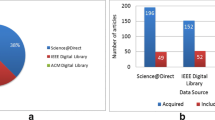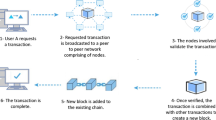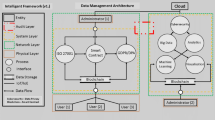Abstract
Purpose of Review
This review highlights the fragmented network of gambling operators as a significant obstacle to effective harm reduction (HR) settings (e.g., bet/spend limits, self-exclusion). Players struggle to track their betting across operators without the ability to set universal limits, a situation exacerbated by the rising accessibility of gambling in the US. Using the strengths of blockchain technology as a digital ledger that securely records transactions, the present commentary proposes a blockchain ecosystem that could enhance bet tracking and enable universal application of HR settings.
Recent Findings
Past research blockchain technology within the context of gambling largely focuses on cryptocurrencies as a payment method. While a concern for regulators, the focus of the present paper is on the largely unexplored area of decentralized gambling applications and their potential in facilitating HR settings via smart contracts (i.e., digitally self-executing contracts). Theoretically, smart contracts could be tailored to consider players’ HR settings prior to a bet being approved. When included within a unified blockchain network, players’ real-time gambling activities would be tracked in conjunction with their universally applied HR settings, thus enhancing the efficacy of these HR settings.
Summary
The proposal for a blockchain ecosystem aims to create a safer gambling landscape by simplifying bet tracking, and thus, increasing adherence to limit settings across operators and platforms. Despite potential scalability issues as well as legal challenges, this innovative approach would reduce risks and foster safer gambling practices. Future directions for research and policy development are offered.


Similar content being viewed by others
References
Papers of particular interest, published recently, have been highlighted as: • Of importance •• Of major importance
National Council on Problem Gambling. National survey on gambling attitudes and gambling experiences 1.0 [Internet]. 2021. Available from: www.ncpgsurvey.org
Welte JW, Barnes GM, Tidwell MCO, Hoffman JH, Wieczorek WF. Gambling and problem gambling in the United States: changes between 1999 and 2013. J Gambl Stud. 2015;31(3):695–715.
Williams RJ, Volberg RA, Stevens RMG. The population prevalence of problem gambling: methodological influences, standardized rates, jurisdictional differences, and worldwide trends [Internet]. Ontario Problem Gambling Research Centre; 2012 May [cited 2022 Sep 13]. Available from: https://opus.uleth.ca/handle/10133/3068. The paper offers a systematic review of the prevalence of gambling around the world as well as a pooled prevalence rate.
American Gaming Association [Internet]. [cited 2024 Feb 25]. Interactive U.S. map: sports betting. Available from: https://www.americangaming.org/research/state-gaming-map/
BettingUSA. States with legal betting: which states allow online gambling? [Internet]. 2018 [cited 2024 Feb 25]. Available from: https://www.bettingusa.com/states/
John B, Holloway K, Davies N, May T, Buhociu M, Cousins AL, et al. Gambling harm as a global public health concern: a mixed method investigation of trends in Wales. Front Public Health [Internet]. 2020 [cited 2024 Feb 17];8. Available from: https://www.frontiersin.org/journals/public-health/articles/https://doi.org/10.3389/fpubh.2020.00320
Hilbrecht M, Baxter D, Abbott M, Binde P, Clark L, Hodgins DC, et al. The conceptual framework of harmful gambling: a revised framework for understanding gambling harm. J Behav Addict. 2020;9(2):190–205.
Hing N, Browne M, Russell AMT, Rockloff M, Rawat V, Nicoll F, et al. Avoiding gambling harm: an evidence-based set of safe gambling practices for consumers. PLoS One. 2019;14(10):e0224083. This paper presents findings on the gambling behaviors that associated with less severe gambling-related harms.
Sulkunen P, Babor TF, Cisneros Örnberg J, Egerer M, Hellman M, Livingstone C, et al. Setting limits: gambling, science and public policy—summary of results. Addiction. 2021;116(1):32–40. https://doi.org/10.1111/add.15241.
Hopfgartner N, Auer M, Santos T, Helic D, Griffiths MD. Cooling off and the effects of mandatory breaks in online gambling: a large-scale real-world study. Int J Ment Health Addict [Internet]. 2023 Jan 17 [cited 2023 Oct 26]; Available from: https://doi.org/10.1007/s11469-022-00996-7. This study examines the effects of mandatory play breaks on online gamblers, revealing that longer breaks encourage longer voluntary breaks and more interaction with responsible gambling tools, although sustained post-intervention effects are limited and mostly observed in gamblers who experienced numerous long breaks.
Gainsbury SM. Review of self-exclusion from gambling venues as an intervention for problem gambling. J Gambl Stud. 2014;23. The paper presents a systematic review of self-exclusion as an approach to minimize gambling-related harms.
Caillon J, Grall-Bronnec M, Perrot B, Leboucher J, Donnio Y, Romo L, et al. Effectiveness of at-risk gamblers’ temporary self-exclusion from Internet gambling sites. J Gambl Stud. 2019;35(2):601–15.
American Psychiatric Association. Diagnostic and statistical manual of mental disorders. 5th ed. (Text Revised) Arlington, VA: American Psychiatric Publishing; 2023.
Hodgins DC, Stea JN, Grant JE. Gambling disorders. The Lancet. 2011;378(9806):1874–84.
Potenza MN, Balodis IM, Derevensky J, et al. Gambling disorder. Nat Rev Dis Primers. 2019;5(1). https://doi.org/10.1038/s41572-019-0099-7.
Armoon B, Griffiths MD, Mohammadi R, Ahounbar E. Suicidal behaviors and associated factors among individuals with gambling disorders: a meta-analysis. J Gambl Stud. 2023;39(2):751–77.
Barrault S, Bonnaire C, Herrmann F. Anxiety, depression and emotion regulation among regular online poker players. J Gambl Stud. 2017;33(4):1039–50.
Giovanni M, Fabiola S, Federica F, et al. Gambling disorder and suicide: an overview of the associated co-morbidity and clinical characteristics. Int J High Risk Behav Addict. 2017;6(3). https://doi.org/10.5812/ijhrba.30827.
Keough MT, Penniston TL, Vilhena-Churchill N, Michael Bagby R, Quilty LC. Depression symptoms and reasons for gambling sequentially mediate the associations between insecure attachment styles and problem gambling. Addict Behav. 2017;2018(78):166–72.
Martin RJ, Usdan S, Cremeens J, Vail-Smith K. Disordered gambling and co-morbidity of psychiatric disorders among college students: an examination of problem drinking, anxiety and depression. J Gambl Stud. 2014;30(2):321–33.
Dowling NA, Oldenhof E, Cockman S, Suomi A, Merkouris SS, Jackson AC. Problem gambling and family violence: factors associated with family violence victimization and perpetration in treatment-seeking gamblers. J Interpers Violence. 2021;36(15–16):7645–69.
Goghari VM, Shakeel MK, Swan JL, Kim HS, Sharif-Razi M, Hodgins DC. A family study of trauma and coping strategies in gambling disorder. J Gambl Stud. 2020;36(3):767–82.
Uwiduhaye MA, Niyonsenga J, Muhayisa A, Mutabaruka J. Gambling, family dysfunction and psychological disorders: a cross- sectional study. J Gambl Stud. 2021;37(4):1127–37.
Harwell W, Spare KE, Mills DJ, Lee U, Lewis LE. 2022 Oklahoma gambling prevalence study. Unpublished report. 2023.
Nower L, Caler K, Peters E. The prevalence of online and land-based gambling in New Jersey. New Brunswick, NJ: Authors; 2017. Available from: https://socialwork.rutgers.edu/centers/center-gambling-studies/research-publications.
Carliner H, Auerbach A, Showalter E, Reynoso N, Robertson N, Rana P, et al. 2021 Statewide assessment of gambling and problem gambling in Illinois [Internet]. Boston, MA: Health Resources in Action; 2021 [cited 2023 Jul 18]. Available from: https://e.helplineil.org/areyoureallywinning/statewide-gambling-assessment/
Spare KE, Harwell W, Mills DJ, Lee U, Lewis LE. 2022 Missouri gambling prevalence study. Unpublished report. 2023.
National Council on Problem Gambling [Internet]. [cited 2023 Oct 25]. Frequently Asked Questions. Available from: https://www.ncpgambling.org/help-treatment/faq/
Abbott MW. The changing epidemiology of gambling disorder and gambling-related harm: public health implications. Public Health. 2020;5. https://doi.org/10.1016/j.puhe.2020.04.001.
Abbott MW. Gambling and gambling-related harm: recent World Health Organization initiatives. Public Health. 2020;1(184):56–9.
Raisamo S, Halme J, Murto A, Lintonen T. Gambling-related harms among adolescents: a population-based study. J Gambl Stud. 2013;29(1):151–9.
Wardle H, Reith G, Langham E, Rogers RD. Gambling and public health: we need policy action to prevent harm. BMJ. 2019;8:11807.
Browne M, Goodwin BC, Rockloff MJ. Validation of the short gambling harm screen (SGHS): a tool for assessment of harms from gambling. J Gambl Stud. 2018;34(2):499–512.
Shannon K, Anjoul F, Blaszczynski A. Mapping the proportional distribution of gambling-related harms in a clinical and community sample. Int Gambl Stud. 2017;17(3):366–85.
Browne M, Greer N, Rawat V, Rockloff M. A population-level metric for gambling-related harm. Int Gambl Stud. 2017;17(2):163–75.
Blaszczynski A, Ladouceur R, Shaffer HJ. A science-based framework for responsible gambling: the Reno Model. J Gambl Stud. 2004;20(3):301–17.
Blaszczynski A, Collins P, Fong D, Ladouceur R, Nower L, Shaffer HJ, et al. Responsible gambling: general principles and minimal requirements. J Gambl Stud. 2011;27(4):565–73.
Shaffer HJ, Ladouceur R. Moving away from individual responsibility: a comment. J Gambl Stud. 2021;37(3):1071–8.
Livingstone C, Rintoul A. Moving on from responsible gambling: a new discourse is needed to prevent and minimise harm from gambling. Public Health. 2020;184:107–12.
Hancock L, Smith G. Critiquing the Reno Model I-IV international influence on regulators and governments (2004–2015)— the distorted reality of “responsible gambling.” Int J Ment Health Addict. 2017;15(6):1151–76.
Ladouceur R, Shaffer P, Blaszczynski A, Shaffer HJ. Responsible gambling: a synthesis of the empirical evidence. Addict Res Theory. 2017;25(3):225–35.
Harris A, Griffiths MD. A critical review of the harm-minimisation tools available for electronic gambling. J Gambl Stud. 2017;33(1):187–221.
Christensen DR, Nicoll F, Williams RJ, Shaw CA, el-Guebaly N, el-Hodgins DC, et al. Responsible gambling in Canada: an analysis of the RG Check patron surveys. J Gambl Stud. 2022;38(3):905–15.
Gainsbury SM, Angus DJ, Procter L, Blaszczynski A. Use of consumer protection tools on Internet gambling sites: customer perceptions, motivators, and barriers to use. J Gambl Stud. 2020;36(1):259–76.
Delfabbro P, King DL. The value of voluntary vs. mandatory responsible gambling limit-setting systems: a review of the evidence. Int Gambl Stud. 2021;21(2):255–71.
Livingstone C, Rintoul A, de Lacy-Vawdon C, Borland R, Dietze P, Jenkinson R, et al. Identifying effective policy interventions to prevent gambling-related harm [Internet]. Victorian Responsible Gambling Foundation; 2019 [cited 2023 Jul 25]. Available from: https://research.monash.edu/en/publications/identifying-effective-policy-interventions-to-prevent-gambling-re
Broda A, LaPlante DA, Nelson SE, LaBrie RA, Bosworth LB, Shaffer HJ. Virtual harm reduction efforts for Internet gambling: effects of deposit limits on actual Internet sports gambling behavior. Harm Reduct J. 2008;5(1):1–9.
Auer M, Reiestad SH, Griffiths MD. Global limit setting as a responsible gambling tool: what do players think? Int J Ment Health Addict. 2020;18(1):14–26.
IBM. Norsk Tipping | IBM [Internet]. [cited 2023 Oct 27]. Available from: https://www.ibm.com/case-studies/norsk-tipping
Hoffmann B. How Norsk Tipping prevents problem gambling among online casino players. In: International Conference on Gambling & Risk Taking [Internet]. 2023 [cited 2023 Jun 25]. Available from: https://digitalscholarship.unlv.edu/gaming_institute/2023/May24/15
Auer M, Hopfgartner N, Griffiths MD. The effect of loss-limit reminders on gambling behavior: a real-world study of Norwegian gamblers. J Behav Addict. 2018;7(4):1056–67. The paper presents results from a study on player perceptions of instituting global limits for gambling.
Ramesh G, Kumar BA, Jugge P, Prasad KL, Hasan MK. Blockchain technology for IoT and wireless communications. Vol First edition. CRC Press; 2024.
Comuzzi Marco, Grefen Paul, Meroni Giovanni. Blockchain for business : IT principles into practice. Vol. 1 Edition. New York, NY: Routledge; 2023. [cited 2023 Oct 27]. Available from: http://lib-e2.lib.ttu.edu/login?url=https://search.ebscohost.com/login.aspx?direct=true&;AuthType=ip,cookie,url,uid&;db=nlebk&;AN=3610898&;site=ehost-live
Vyas S, Shukla VK, Gupta S, Prasad A. Blockchain technology : exploring opportunities, challenges, and applications. Boca Raton, FL: CRC Press; 2022. [cited 2023 Oct 27]. Available from: https://learning.oreilly.com/library/view/blockchain-technology/9781000567199/xhtml/cover.xhtml.
Yahoo Finance [Internet]. 2023 [cited 2023 Nov 6]. Charlie Munger: “I’m not proud of my country” for allowing “crypto sh-t.” Available from: https://finance.yahoo.com/news/charlie-munger-im-not-proud-of-my-country-for-allowing-crypto-sh-t-202109158.html
Faverio M, Sidoti O. Majority of Americans aren’t confident in the safety and reliability of cryptocurrency [Internet]. Pew Research Center. [cited 2023 Nov 6]. Available from: https://www.pewresearch.org/short-reads/2023/04/10/majority-of-americans-arent-confident-in-the-safety-and-reliability-of-cryptocurrency/
Morning Consult Pro [Internet]. [cited 2023 Nov 6]. Report: U.S. public opinion on cryptocurrency. Available from: https://pro.morningconsult.com/analyst-reports/state-of-cryptocurrency
Delfabbro P, King D, Williams J, Georgiou N. Cryptocurrency trading, gambling and problem gambling. Addict Behav. 2021;122:107021.
Johnson B, Co S, Sun T, Lim CCW, Stjepanović D, Leung J, et al. Cryptocurrency trading and its associations with gambling and mental health: a scoping review. Addict Behav. 2023;136:107504. The paper presents a systematic review of the harms associated with cryptocurrency trading.
Mills DJ, Nower L. Preliminary findings on cryptocurrency trading among regular gamblers: a new risk for problem gambling? Addict Behav. 2019;1(92):136–40.
Oksanen A, Mantere E, Vuorinen I, Savolainen I. Gambling and online trading: emerging risks of real-time stock and cryptocurrency trading platforms. Public Health. 2022;1(205):72–8.
Andrade M, Sharman S, Xiao LY, Newall PWS. Safer gambling and consumer protection failings among 40 frequently visited cryptocurrency-based online gambling operators. Psychol Addict Behav. 2023;37(3):545–57. The paper presents a study of cryptocurrency-based online gambling operators’ establishment of various player protections.
Büyüközkan G, Göçer F. Digital supply chain: literature review and a proposed framework for future research. Comput Ind. 2018;1(97):157–77.
Choo KKR, Ozcan S, Dehghantanha A, Parizi RM. Editorial: blockchain ecosystem—technological and management opportunities and challenges. IEEE Trans Eng Manag. 2020;67(4):982–7.
Scholten OJ, Hughes NGJ, Deterding S, Drachen A, Walker JA, Zendle D. Ethereum Crypto-games: mechanics, prevalence, and gambling similarities. In: Proceedings of the annual symposium on computer-human interaction in play [Internet]. Barcelona Spain: ACM; 2019 [cited 2023 Oct 6]. p. 379–89. Available from:https://doi.org/10.1145/3311350.3347178. The paper presents a review of the similarities between various crypto-games and other gambling activities.
Scholten OJ, Zendle D, Walker JA. Inside the decentralised casino: a longitudinal study of actual cryptocurrency gambling transactions. PLoS One. 2020;15(10):e0240693. The paper presents findings from a review of millions of transactions within a decentralized gambling application in an effort to identify player profiles based on spending behaviors.
Zheng P, Jiang Z, Wu J, Zheng Z. Blockchain-based decentralized application: a survey. IEEE Open J Comput Soc. 2023;4:121–33.
Iyer K, Dannen C. Building games with Ethereum smart contracts: intermediate projects for solidity developers. Brooklyn, New York, USA: Springer; 2018. [cited 2023 Oct 27]. Available from: https://learning.oreilly.com/library/view/building-games-with/9781484234921/.
Zheng Z, Xie S, Dai HN, Chen W, Chen X, Weng J, et al. An overview on smart contracts: challenges, advances and platforms. Future Gener Comput Syst. 2020;1(105):475–91.
DappRadar. DappRadar. [cited 2023 Jun 15]. Top blockchain DApps. Available from: https://dappradar.com/rankings/gambling/category/other_gambling
SX Network. The SX Mission [Internet]. [cited 2023 Jul 5]. Available from: https://docs.sx.technology/sx-overview/master
Decentral Games [Internet]. [cited 2023 Nov 2]. Available from: https://docs.decentral.games/welcome/master
JustBet. JustBet Documents [Internet]. [cited 2023 Jun 25]. Available from: https://docs.just.bet/justbet/
Peterson DJ, Krug J. Augur: a decentralized, open-source platform for prediction markets. Available from: https://smallake.kr/wp-content/uploads/2016/05/augur.pdf
Peterson J, Krug J, Zoltu M, Williams AK, Alexander S. Augur: a decentralized oracle and prediction market platform (v2.0). Available from: https://arxiv.org/abs/1501.01042
Azuro. Azuro Docs [Internet]. [cited 2023 Jun 25]. Available from: https://gem.azuro.org/
Li W, Guo H, Nejad M, Shen CC. Privacy-preserving traffic management: a blockchain and zero-knowledge proof inspired approach. IEEE Access. 2020;8:181733–43.
Sun X, Yu FR, Zhang P, Sun Z, Xie W, Peng X. A survey on zero-knowledge proof in blockchain. IEEE Netw. 2021;35(4):198–205.
Tomaz AEB, Nascimento JCD, Hafid AS, De Souza JN. Preserving privacy in mobile health systems using non-interactive zero-knowledge proof and blockchain. IEEE Access. 2020;8:204441–58.
Avellaneda O, Bachmann A, Barbir A, Brenan J, Dingle P, Duffy KH, et al. Decentralized identity: where did it come from and where is it going? IEEE Commun Stand Mag. 2019;3(4):10–3.
Maldonado-Ruiz D, Torres J, El Madhoun N, Badra M. An innovative and decentralized identity framework based on blockchain technology. In: 2021 11th IFIP International Conference on New Technologies, Mobility and Security (NTMS) [Internet]. Paris, France: IEEE; 2021 [cited 2023 Dec 19]. p. 1–8. Available from: https://ieeexplore.ieee.org/document/9432656/
Mendez Mena DM, Yang B. Blockchain-based whitelisting for consumer IoT devices and home networks. In: Proceedings of the 19th Annual SIG Conference on Information Technology Education. ACM; 2018. pp. 7–12. https://doi.org/10.1145/3241815.3241853.
New Jersey – Internet and mobile gaming [Internet]. [cited 2023 Nov 7]. Available from: https://www.gamingregulation.com/regulation/united-states/new-jersey/interactive-gaming/
Wang Q, Wang C, Li J, Ren K, Lou W. Enabling public verifiability and data dynamics for storage security in cloud computing. In: Backes M, Ning P, editors. Computer security – ESORICS 2009. Berlin, Heidelberg: Springer; 2009. p. 355–70. (Lecture Notes in Computer Science). https://doi.org/10.1007/978-3-642-04444-1_22.
Wang C, Liu X, Li H, Di X, Cong L, Zhang S, et al. Smart contract-based integrity audit method for IoT. Inf Sci. 2023;1(647):119413.
Al-Breiki H, Rehman MHU, Salah K, Svetinovic D. Trustworthy blockchain oracles: review, comparison, and open research challenges. IEEE Access. 2020;8:85675–85.
Singh A, Click K, Parizi RM, Zhang Q, Dehghantanha A, Choo KKR. Sidechain technologies in blockchain networks: an examination and state-of-the-art review. J Netw Comput Appl. 2020;1(149):102471.
Xu Z, Chen L. L2chain: towards high-performance, confidential and secure Layer-2 blockchain solution for decentralized applications. Proc VLDB Endow. 2022;16(4):986–99.
Gangwal A, Gangavalli HR, Thirupathi A. A survey of Layer-two blockchain protocols. J Netw Comput Appl. 2023;1(209):103539.
Marchica L, Derevensky JL. Examining personalized feedback interventions for gambling disorders: a systematic review. J Behav Addict. 2016;5(1):1–10. The paper presents a systematic review of the theory and research surrounding personalized normative feedback and applies it to the gambling space.
Neighbors C, Rodriguez LM, Rinker DV, Gonzales RG, Agana M, Tackett JL, et al. Efficacy of personalized normative feedback as a brief intervention for college student gambling: a randomized controlled trial. J Consult Clin Psychol. 2015;83(3):500–11.
GOV.UK [Internet]. [cited 2023 Nov 7]. Major reform of gambling laws to protect vulnerable users in smartphone era. Available from: https://www.gov.uk/government/news/major-reform-of-gambling-laws-to-protect-vulnerable-users-in-smartphone-era
Nower L, Glynn J. Adopting an affordability approach to responsible gambling and harm reduction: considerations for implementation in a North American context. Gaming Law Rev. 2022;26(9):466–76. The paper presents a legal review of the possibility of using affordability as evidence of possible harm reduction.
Author information
Authors and Affiliations
Contributions
The author conceptualized, wrote, and edited the paper.
Corresponding author
Ethics declarations
Competing interests
The authors declare no competing interests.
Conflict of Interest
The authors declare no competing interests.
Human and Animal Rights and Informed Consent
This article is a review and therefore did not include any studies with human or animal subjects.
Additional information
Publisher's Note
Springer Nature remains neutral with regard to jurisdictional claims in published maps and institutional affiliations.
Rights and permissions
Springer Nature or its licensor (e.g. a society or other partner) holds exclusive rights to this article under a publishing agreement with the author(s) or other rightsholder(s); author self-archiving of the accepted manuscript version of this article is solely governed by the terms of such publishing agreement and applicable law.
About this article
Cite this article
Mills, D.J. On the Potential Benefits of Blockchain Technology in Gambling: A Perspective on Harm Reduction. Curr Addict Rep (2024). https://doi.org/10.1007/s40429-024-00561-3
Accepted:
Published:
DOI: https://doi.org/10.1007/s40429-024-00561-3




